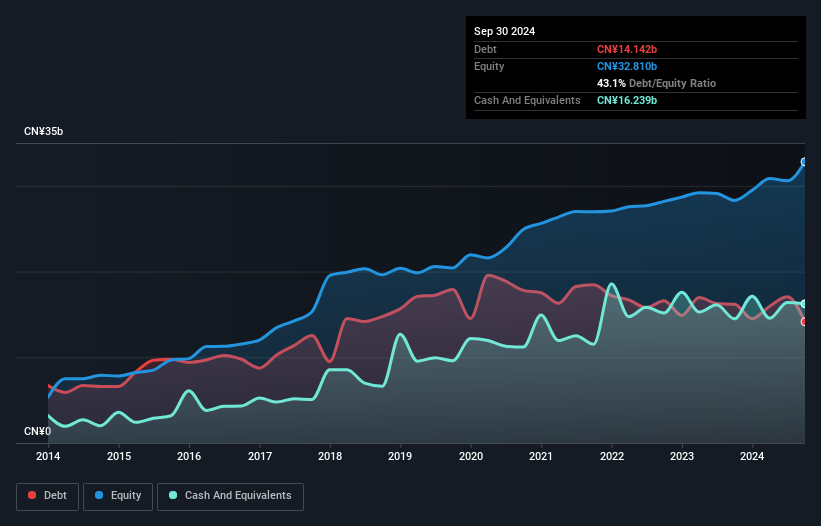- China
- /
- Healthcare Services
- /
- SHSE:600998
We Think Jointown Pharmaceutical Group (SHSE:600998) Can Stay On Top Of Its Debt

Howard Marks put it nicely when he said that, rather than worrying about share price volatility, 'The possibility of permanent loss is the risk I worry about... and every practical investor I know worries about.' It's only natural to consider a company's balance sheet when you examine how risky it is, since debt is often involved when a business collapses. We note that Jointown Pharmaceutical Group Co., Ltd (SHSE:600998) does have debt on its balance sheet. But the more important question is: how much risk is that debt creating?
When Is Debt A Problem?
Debt assists a business until the business has trouble paying it off, either with new capital or with free cash flow. In the worst case scenario, a company can go bankrupt if it cannot pay its creditors. However, a more common (but still painful) scenario is that it has to raise new equity capital at a low price, thus permanently diluting shareholders. By replacing dilution, though, debt can be an extremely good tool for businesses that need capital to invest in growth at high rates of return. The first thing to do when considering how much debt a business uses is to look at its cash and debt together.
See our latest analysis for Jointown Pharmaceutical Group
How Much Debt Does Jointown Pharmaceutical Group Carry?
As you can see below, Jointown Pharmaceutical Group had CN¥14.1b of debt at September 2024, down from CN¥16.2b a year prior. But on the other hand it also has CN¥16.2b in cash, leading to a CN¥2.10b net cash position.

How Healthy Is Jointown Pharmaceutical Group's Balance Sheet?
According to the last reported balance sheet, Jointown Pharmaceutical Group had liabilities of CN¥65.7b due within 12 months, and liabilities of CN¥2.52b due beyond 12 months. Offsetting this, it had CN¥16.2b in cash and CN¥43.2b in receivables that were due within 12 months. So its liabilities total CN¥8.76b more than the combination of its cash and short-term receivables.
This deficit isn't so bad because Jointown Pharmaceutical Group is worth CN¥26.5b, and thus could probably raise enough capital to shore up its balance sheet, if the need arose. But it's clear that we should definitely closely examine whether it can manage its debt without dilution. While it does have liabilities worth noting, Jointown Pharmaceutical Group also has more cash than debt, so we're pretty confident it can manage its debt safely.
Notably Jointown Pharmaceutical Group's EBIT was pretty flat over the last year. We would prefer to see some earnings growth, because that always helps diminish debt. The balance sheet is clearly the area to focus on when you are analysing debt. But it is future earnings, more than anything, that will determine Jointown Pharmaceutical Group's ability to maintain a healthy balance sheet going forward. So if you want to see what the professionals think, you might find this free report on analyst profit forecasts to be interesting.
Finally, while the tax-man may adore accounting profits, lenders only accept cold hard cash. While Jointown Pharmaceutical Group has net cash on its balance sheet, it's still worth taking a look at its ability to convert earnings before interest and tax (EBIT) to free cash flow, to help us understand how quickly it is building (or eroding) that cash balance. During the last three years, Jointown Pharmaceutical Group produced sturdy free cash flow equating to 79% of its EBIT, about what we'd expect. This free cash flow puts the company in a good position to pay down debt, when appropriate.
Summing Up
Although Jointown Pharmaceutical Group's balance sheet isn't particularly strong, due to the total liabilities, it is clearly positive to see that it has net cash of CN¥2.10b. And it impressed us with free cash flow of CN¥317m, being 79% of its EBIT. So we don't have any problem with Jointown Pharmaceutical Group's use of debt. The balance sheet is clearly the area to focus on when you are analysing debt. However, not all investment risk resides within the balance sheet - far from it. To that end, you should be aware of the 1 warning sign we've spotted with Jointown Pharmaceutical Group .
When all is said and done, sometimes its easier to focus on companies that don't even need debt. Readers can access a list of growth stocks with zero net debt 100% free, right now.
If you're looking to trade Jointown Pharmaceutical Group, open an account with the lowest-cost platform trusted by professionals, Interactive Brokers.
With clients in over 200 countries and territories, and access to 160 markets, IBKR lets you trade stocks, options, futures, forex, bonds and funds from a single integrated account.
Enjoy no hidden fees, no account minimums, and FX conversion rates as low as 0.03%, far better than what most brokers offer.
Sponsored ContentNew: Manage All Your Stock Portfolios in One Place
We've created the ultimate portfolio companion for stock investors, and it's free.
• Connect an unlimited number of Portfolios and see your total in one currency
• Be alerted to new Warning Signs or Risks via email or mobile
• Track the Fair Value of your stocks
Have feedback on this article? Concerned about the content? Get in touch with us directly. Alternatively, email editorial-team (at) simplywallst.com.
This article by Simply Wall St is general in nature. We provide commentary based on historical data and analyst forecasts only using an unbiased methodology and our articles are not intended to be financial advice. It does not constitute a recommendation to buy or sell any stock, and does not take account of your objectives, or your financial situation. We aim to bring you long-term focused analysis driven by fundamental data. Note that our analysis may not factor in the latest price-sensitive company announcements or qualitative material. Simply Wall St has no position in any stocks mentioned.
About SHSE:600998
Jointown Pharmaceutical Group
Provides pharmaceutical supply chain services in China.
Flawless balance sheet, undervalued and pays a dividend.
Market Insights
Community Narratives



